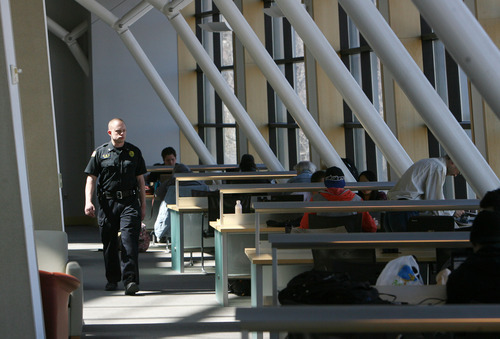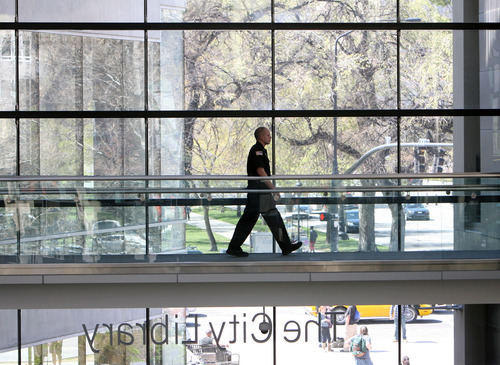This is an archived article that was published on sltrib.com in 2012, and information in the article may be outdated. It is provided only for personal research purposes and may not be reprinted.
Public libraries nationwide are accustomed to their dual role as book depositories and resource centers for the unemployed and homeless.
Libraries aren't just about helping people check out books, says Julianne Hancock, spokesperson for the Salt Lake City Public Library system. "Our mission is about connecting people to all sorts of information resources, many times in non-traditional ways."
But as the ranks of indigent patrons ebb and flow, fewer libraries are content to manage problem behaviors without backup.
The majority of police calls to Library Square last year involved smoking-related infractions, followed by incidents involving alcohol or theft. Police calls are common to both Library Square and Washington Square to the west, home block to the City and County Building
The main branch patrols its own interior with two to three security staff. The square outside the library is considered part of Salt Lake City's parks, and is patrolled by Salt Lake City police officers.
In a new program introduced this month, the library will begin working with Salt Lake County Human Services, the Utah Department of Workforce Services and Salt Lake City police to direct patrons to social services including homeless shelters, mental health counseling or substance-abuse prevention programs. But only with patrons' consent, Hancock stressed.
"We're not forcing services down anyone's throat," Hancock said. "Everyone's welcome here. Most people spend their time here productively. We don't want to stop that. But this is a place where we have a large homeless population, and we want to provide services to those who might need them most. This is a great opportunity to focus on a larger challenge."
Three full-time outreach workers from Volunteers of America (VOA) will be at the main library sometime this month, offering information, counseling and transportation to service providers for patrons in need. VOA outreach workers will later train library staff in de-escalation skills to minimize conflicts with patrons.
"Safety and stability is a large part of what the library's asking for, and we're ready to help with that," said Kathy Bray, president and CEO of Volunteers of America Utah Chapter.
The program was initiated by Linda Hamilton, the library's transitional director, Hancock said. As chief administrative officer at Salt Lake County before coming to the Salt Lake City Library in the wake of Beth Elder's resignation last year, Hamilton's expertise with county operations is expected to make the new program as efficient and effective as possible.
"It's about all of us coming together to see how we can benefit the library and its programs," said Tim Whalen, mental health director at Salt Lake County Division of Behavioral Health.
Whalen said the outreach effort may extend to the library's system's Sugar House branch library as well, which has recurring issues with homeless youth.
The program will be funded by Salt Lake County, which will pay for the three VOA workers outreach efforts at the main library. Staff from Utah Department of Workforce Services will enter the mix later, providing training that will help library staff educate patrons in computer and Internet skills that might help them find employment opportunities.
Molly Raphael, president of the American Library Association, said the Salt Lake City library program sounds familiar to those she helped oversee when she held director positions at the District of Columbia Public Library and the Multnomah County Library System in Portland, Ore.
"Any issue out there in society always spills into public libraries due to their nature as institutions," Raphael said. "Libraries by their nature are welcoming and open to everyone, as long as you behave."
Twitter: @Artsalt
Facebook.com/nowsaltlake







